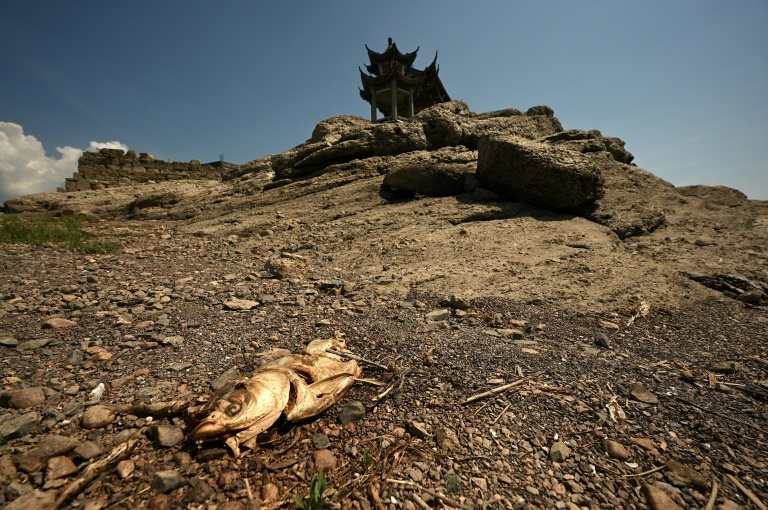Southern China has recorded its longest continuous period of high temperatures since records began in 1961
China’s autumn harvest is under “severe threat” from high temperatures and drought, authorities have warned, promising Wednesday fresh steps to protect crops in the face of the country’s hottest summer on record.
The world’s second-largest economy has been hit by record heat, flash floods and droughts this summer — phenomena that scientists say are becoming more frequent and intense due to climate change.
Southern China has recorded its longest continuous period of high temperatures since records began more than 60 years ago, the agriculture ministry said.
Four government departments urged the conservation of “every unit of water” to protect crops.
“The rapid development of drought superimposed with high temperatures and heat damage has caused a severe threat to autumn crop production,” a statement said Tuesday.
China produces more than 95 percent of the rice, wheat and maize it consumes, but a reduced harvest could mean increased demand for imports in the world’s most populous country — putting further pressure on global supplies already strained by the conflict in Ukraine.
State media reported Wednesday evening that the government had pledged 10 billion yuan ($1.45 billion) to help ensure good rice harvests this autumn.
A meeting of Beijing’s State Council, presided over by Premier Li Keqiang, had agreed the government should “do an even better job in fighting and reducing drought”, broadcaster CCTV said.
Officials also called for “a combination of measures to increase water sources to fight drought, first ensure drinking water for the people, ensure water for agricultural irrigation, and guide farmers to fight drought and protect autumn grain”, it added.
Temperatures as high as 45 degrees Celsius (113 Fahrenheit) have led multiple Chinese provinces to impose power cuts, as cities struggle to cope with a surge in demand for electricity partly driven by people cranking up the air conditioning.
The heat broke records in Sichuan, where a temperature of 43.9 degrees Celsius (111 Fahrenheit) was recorded Wednesday afternoon, the province’s Meteorological Service Centre said in a statement.
The megacities of Shanghai and Chongqing have turned off outdoor decorative lighting, while authorities in Sichuan have imposed industrial power cuts after water levels dropped at key hydroelectric plants.
The searing heat is also drying up the critical Yangtze River, with water flow on its main trunk about 50 percent lower than the average over the last five years, state media outlet China News Service reported last week.
– ‘Worst heatwave ever’ –
In Chongqing, where more than 1,500 people were evacuated from areas hit by multiple wildfires, locals were struggling.
“I feel too hot to sleep every night, and I’m awakened by the heat every morning,” Xu Jinxin, a 20-year-old student, told AFP.
“Because of the electricity shortage, we don’t leave the air conditioner on all day but rather turn it off once it’s cooled down a bit.”
The national meteorological service renewed warnings for drought and high temperatures on Tuesday, calling on 11 provincial governments to activate emergency responses.
Authorities have turned to cloud seeding — a method to induce rainfall — in parts of the country.
CCTV published footage this month showing meteorological workers shooting catalyst rockets into the sky and firefighters transporting water to farmers in need.
It also broadcast images Wednesday of water trucks supplying people in villages in Sichuan and around Chongqing in a bid to counter shortages.
“The people with water supply difficulties in rural areas of Chongqing are mainly concentrated in mountain towns and relatively remote areas,” CCTV said.
“This is the worst heatwave ever recorded,” climate and energy expert Liu Junyan of Greenpeace East Asia told AFP.
“Climate science shows extreme heat is becoming exponentially worse,” she said.
“So it’s more likely that next year will have record-breaking heat.”
The extreme weather is raising public awareness of climate change in China, with state media “now coming around to covering climate impacts” with unprecedented urgency, Liu said.
Government climate expert Zhou Bing warned over the weekend of mass displacement caused by climate change, describing extreme weather as nature’s “revenge” on humanity.
China has experienced three other episodes of intense heat so far this century — in 2003, 2013 and 2017.
The gap between heatwaves is “significantly shortening”, according to Zhou.
For those living through the sweltering summer, “life goes on with some endurance”, said Xu, the Chongqing student.









